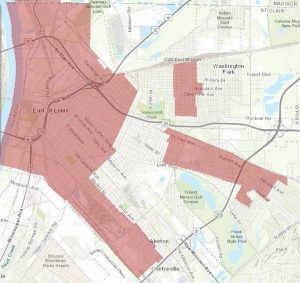Metro East news briefs
February 12, 2020
Opportunity Zones in and around East St. Louis. Illinois has 327 Opportunity Zones, including a dozen in Metro East.
Illinois boosts funding for opportunity zones
The Illinois Department of Commerce and Economic Opportunity (DCEO), Jan. 27, announced a new competitive grant program; offering a total of $12 million to encourage development in federally recognized Opportunity Zones (OZ) around the Prairie state.
Authorized under the Federal Tax Reform and Jobs Act of 2017, the OZ program offers investors potential to defer or completely escape capital gains taxes by investing gains in designed areas within some of the nation’s most impoverished areas.
Illinois has 327 Opportunity Zones, including a dozen in Metro East.
However, across the nation, investors have shown little interest in OZs.
Meanwhile, Illinois’ Enterprise Zone program, which offers a variety of state and local tax incentives for development in designated areas, have spurred numerous, large business and industrial projects, around the state, including the Granite City and O’Fallon areas.
Details of the new competitive grant program will be outlined in a notice of funding opportunity (NOFO) due for release shortly, according to the department.
The capital grants will offer matching funds for infrastructure, utility, remediation and other site preparedness related costs for affordable housing, community development, or commercial real estate projects.
Communities, nonprofits, developers, and other stakeholders will have 90 days to prepare and submit grant applications, once the NOFO is posted.
Funding for the new grant program come from the new $45 billion Rebuilding Illinois capital improvements program.
In scoring grant applications, DCEO will consider criteria such as job creation, community support, project readiness and viability, the availability of matching financing, and compatibility with a five-year state economic plan, released by Gov. J.B. Pritzker in October.
Applicants are encouraged to work with nonprofits, community organizations, elected officials, and other stakeholders to obtain letters that demonstrate local and regional support.
The DCEO plans to host workshops and webinars across Illinois to offer additional guidance on completing grant applications and answer questions. These events are being coordinated with local Small Business Development Centers across the state.
Interested parties can e-mail opportunityzones@illinois.gov to sign up to receive updates on DCEO opportunity zone programming in the future.
During his Feb. 4 State of the Union address, President Donald Trump prominently cited Opportunity Zones as a reason for the nation’s strong economy.
However, development industry analysts in many parts of the nation, including Greater St. Louis, say OZs have drawn little interest from investors.
Illinois becomes at least the 13th state to offer additional support for Opportunity Zones; following Alabama, Arkansas, Connecticut, Hawaii, Louisiana, Maine, Maryland, Michigan, New Jersey, New Mexico, Ohio, and Rhode Island.
Information on all OZs in and near Metro East can be found at https://tinyurl.com/MEOZs
East West Gateway eyes new regionalism study
The East West Gateway Council of Governments (EWG) is considering a formal study on regional ownership of St. Louis-Lambert Airport — and other issues that could be addressed on a regional basis, according to an article is this morning’s Post-Dispatch.
EWG Executive Director Jim Wild is preparing a list of potential issues to be addressed in the study.
The EWG board is scheduled to vote on whether to conduct the regionalism study and the specific issues to be studied during its Feb. 26 meeting.
The study was proposed by EWG Board Chairman Steve Ehlmann, the St. Charles County executive, during the board’s Jan. 29 meeting. Ehlman supports regional ownership of the airport.
However, St. Louis Mayor Lyda Krewson asked EWG to expand the study beyond the airport to include other issues that could be addressed on a regional basis.
Issues suggested during the meeting:
- Services for the homeless ,specifically mentioned by Mayor Krewson.
- Crime and infrastructure, suggested by St. Louis Alderman President Lewis Reed.
- Sales tax hikes in suburban counties to fund the purchase of Lambert from the city for transfer to a regional board, a step proposed by Bridgeton Mayor Terry Briggs.
- Transfer to the city some sales tax money St. Louis County currently gets from Lambert shops, restaurants, and other businesses, also proposed by Alderman President Reed.
- Annexation into the city of vacant airport-owned land in St. Louis County. Reed estimates the annexation would net the city a $35 million to $40 million windfall. The move, however, would be barred by current state law which allows only annexation of land contiguous to a city.
EWG is the federal recognized regional planning body for the St. Louis with its board made up of elected officials from Missouri and Illinois.
St. Clair County municipalities propose merger
Alton and Centreville would merge under propositions on the March 17 election ballots in the two adjacent St. Clair County towns.
The new municipality would be known as “Alcentra,” according to the ballot language.
If the Alton-Centreville merger is approved by voters next month, consolidation with the village of Cahokia, will likely be proposed in November, according to some close to the effort.
Alorton Mayor JoAnn Reed or Centreville Mayor Marius Jackson both support the proposed merger, citing potential cost savings.
However, some residents say the move merely represent an effort by local politicians to consolidate power and the mayors offer no solid evidence of potential cost savings.
Critics also say the move could increase costs by increasing administrative expenses and effectively allowing greater bonded indebtedness.
A letter sent by Mayor Reed to Alorton residents last month suggests consolidation would lead to better road and sewers, housing, jobs, government and lower taxes.
The Alorton Village Board supports the merger although some board members have questions about “process,” according to the letters.
The merger could lead to dissolution Centreville Township, the letter also suggests.
A town hall meeting on the proposed merger, hosted by mayors Reed and Jackson, was scheduled for 6 p.m. on Feb. 11 at the Charlie Coleman Center in Alorton. As the Chronicle went to press.
Township Supervisor Curtis L. McCall and Cahokia mayor Curtis McCall Jr. were expected to attend.
A simple majority in both jurisdictions is required for passage of the ballot measure.
St. Clair County bus system expanding services
The St. Clair County Transit District (SCCTD) Board, Jan. 21, approved the district’s new Transit Vision 2020 Network Plan, which calls for increased frequency on certain routes, expansion of service on weekends and improved service to area hospitals.
As part of the plan, 18 MetroBus routes will be changed, with 15 of the route changes going into effect on June 15.
District officials expect the changes to increase ridership by 12 percent over the next one or two years.
However, they come with some cost. As part of the plan’s approval, the board also adopted a $29.6 million operating budget, an increase of 18.7 percent — or $4.7 million — over the district’s prior fiscal year.
Under the plan, buses will now appear every 15 minutes at stops along several of the district’s most popular routes, including Route 1, East St Louis to Belleville, and Route 12, O’Fallon to Fairview Heights,
Some 60 percent of current customers will be within a quarter mile of these frequent routes, and 64 percent within a half-mile, according to the district.
Almost all other routes will operate consistently every 20 or 30 minutes on weekdays. Most weekend routes will also operate every 20 or 30 minutes during daytime hours.
A new route will be added to connect Memorial Hospital East and HSHS St. Elizabeth’s Hospital via the Frank Scott Parkway.
A new No. 3 route will also create connections between East St. Louis and employment centers in Sauget, Cahokia and North Dupo
Two routes will either be discontinued or replaced; however, the plan offers new options for the riders on those routes, district officials say.
The plan also calls for continuing the SCCTD Flyer on-demand service in East St. Louis and extending its coverage zone into Alorton and the Golden Gardens neighborhood of Centreville.
Route 21, the Scott AFB-Main Base Shuttle, and Route 21x, Scott AFB-East Base Shuttle will also be replaced with the on-demand service.
SCCTD will defer changes to Scott Air force Base, Mascoutah and Lebanon until late 2020 or early 2021.
To view the planned route changes, visit www.scctd.org.
Lauritzen becomes chair-elect at RiverBend association
New Chairman Brad Goacher officially took the reins of the RiverBend Growth Association (RBGA), during the during the organization’s January 23. annual dinner meeting.
Financial services representative Jeff Lauritzen became chairman-elect during balloting at the event.
Brad Goacher is vice president and chief operating officer at Alton Memorial Hospital.
Lauritzen, who will become chairman of the Alton-area chamber of commerce organization in 2021, is a representative for County Financial in Godfrey.








